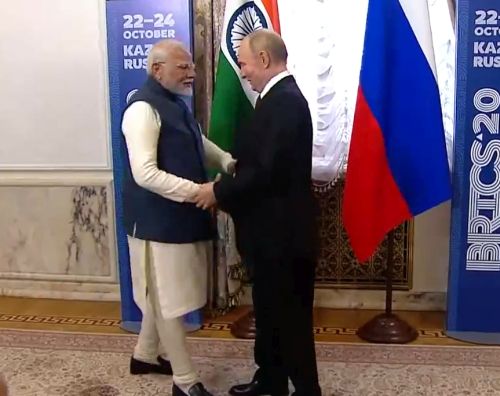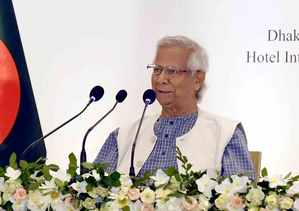International
Slammed by the West, Iranian President Raisi built bridges of friendship with India
New Delhi, May 20 (IANS) Starting as a cleric before moving to the judiciary where he had to solve complex legal cases, and then to politics, where he had to handle tricky issues as Iran’s President, Ebrahim Raisi had a varied and successful career.
Raisi, who died in a helicopter crash as he was returning from the Azerbaijan border on Sunday after flagging off joint projects with his Azeri counterpart Ilham Aliyev, was born on December 14, 1960 in north-eastern city of Mashhad, went to the Islamic seminary of Qom, and gradually rose in his career as a prosecutor and politician.
It did not take Raisi long enough to climb the career success ladder as he became the country’s head of judiciary in 2019 and eventually succeeded Hassan Rouhani as Iran’s eighth President in June 2021.
In the following years, as he solidified his anti-West stand, 63-year-old Raisi was strongly seen as a possible successor to his mentor, Supreme Leader Ayatollah Khamenei.
Even as Washington blamed Tehran for non-compliance with its Joint Comprehensive Plan of Action (JCPOA) commitments, Raisi concentrated on deepening relations with countries like Russia and China.
Weathering several storms, including nationwide protests in September 2022 after the death of Kurdish Iranian woman Mahsa Amini, Raisi emerged as a leader who was not going to wilt under pressure.
As Iran-Russia trade and defence cooperation grew massively, Raisi intensified ties with Moscow with Russian President Vladimir Putin travelling to Tehran in July 2022 – his first trip beyond the territory of former Soviet states since the start of the war with Ukraine.
Under Raisi, Tehran was not only accused of supplying deadly drones to Russia but also selling weapons to countries in Africa, including Sudan.
At the same time, Raisi was building new partnerships, including with India making rapid strides in development under the leadership of Prime Minister Narendra Modi.
India has been pushing extensively for the utilisation of New Delhi-backed Chabahar port in Iran, and its inclusion in the INSTC framework for improving the land-locked Central Asian region’s connectivity with the outside world.
The large-scale 7,200 km-long North-South multimodal trade corridor, which will start from Mumbai with nodes in West Asia, Central Asia, Caucasia and Russia, would eventually link the far-west Russian city of Saint Petersburg to the ports of Iran and India.
In July 2023, Iran – an observer state till then – got a full membership of the Shanghai Cooperation Organisation (SCO) under the rotating chairmanship of India.
A few months later, during their bilateral meeting in Johannesburg on the sidelines of the BRICS Summit, both PM Modi and Raisi also agreed upon fast-tracking infrastructure cooperation, focusing especially on the Chabahar project and the International North-South Transport Corridor (INSTC) – the 7,200 km-long multimodal trade corridor linking Russia with India via the ports of Iran.
Acknowledging India’s growth as an emerging power, Raisi had urged PM Modi to accelerate the process of Iran’s admission to the powerful five-member BRICS grouping that includes Brazil, Russia, India, China, and South Africa.
He also backed New Delhi’s approach that lays significance on strengthening the transport and logistics architecture of the Eurasian region via the INSTC and its linking to Chabahar.
Ironically, India and Iran signed a 10-year contract for the operation of Chabahar Port on May 13, a project which was close to Raisi’s heart as well.
–IANS
as/vd
International
Lee Hsien Yang seeks refuge in United Kingdom

Lee Hsien Yang, the youngest son of Singapore’s founding father, the late Lee Kuan Yew, announced on Tuesday that he is now a political refugee in the United Kingdom after seeking asylum from the British government “as a last resort.”
“I remain a Singapore citizen and hope that someday it will be safe to return home,” Lee stated in a Facebook post, as reported by Channel News Asia (CNA).
Citing what he described as the Singapore government’s “attacks” against him, Lee, who is the younger brother of former Prime Minister Lee Hsien Loong, revealed that he sought asylum protection in 2022.
Lee Hsien Yang and his late sister, Lee Wei Ling, who passed away earlier this month, have been in conflict with their brother Lee Hsien Loong over the fate of their father’s home following his death in 2015, resulting in a public dispute that has estranged the siblings.
In an interview with the UK-based newspaper The Guardian, Lee alleged that a “campaign of persecution” compelled him to seek asylum in Britain.
In response to his claims, the Singapore government stated that there is “no basis” for his allegations of “a campaign of persecution” or other assertions regarding political repression in the country.
“Singapore’s judiciary is impartial and makes decisions independently. This is why Singaporeans have a high level of trust in the judiciary,” a government spokesperson remarked.
The spokesperson added that there are no legal restrictions preventing Lee and his wife, lawyer Lee Suet Fern, from returning to Singapore. “They are and have always been free to return to Singapore,” the spokesperson said.
Lee and his wife have been outside of Singapore since 2022, having opted not to attend a scheduled police interview regarding potential offenses related to providing false evidence in judicial proceedings concerning their father’s will and the family home.
Lee and his late sister, who had been living at the property, alleged they felt threatened while trying to fulfill their father’s wish to demolish the house. They also accused their elder brother, former Prime Minister Lee Hsien Loong, of abusing his governmental influence to advance his personal agenda.
International
Indo-Russian ties are stronger than ever before at BRICS

Kazan, Russia: Prime Minister Narendra Modi held a bilateral meeting with Russian President Vladimir Putin on the sidelines of the 16th BRICS Summit.
During the meeting, President Putin remarked, “I recall our meeting in July, where we had productive discussions on various issues. We’ve also spoken over the phone several times. I am very grateful you accepted the invitation to come to Kazan. Today, we will attend the BRICS Summit’s opening ceremony, followed by dinner.”
PM Modi responded by expressing his appreciation, saying, “I sincerely thank you for your friendship, warm welcome, and hospitality. It’s a great pleasure to visit such a beautiful city as Kazan for the BRICS Summit. India shares deep historical ties with this city, and the opening of our new embassy here will further strengthen these connections.”
International
Laos seeks to enhance nutrition amid climate change concerns

Vientiane (Laos), Aug 22 (IANS) Representatives from the Lao government and development partners have attended a conference here titled “Climate Change and Nutrition in Laos: Intersections and Interventions” to discuss the impact of climate change on nutrition in the Southeast Asia country and potential solutions.
Speaking at the conference, deputy director general of the Department of Hygiene and Health Promotion under the Lao Ministry of Health Viengkhan Phixay, said, “We gather to address a critical and interwoven issue: the impact of climate change on nutrition and how we can work together to tackle these challenges,” Xinhua news agency reported.
The Lao government is actively engaged in this endeavor, with numerous policies and initiatives aimed at addressing both climate change and nutrition, Lao National Television reported on Thursday.
“By leveraging the Scaling Up Nutrition network in Laos, which is led by the government, and supported by civil society, donors, and the United Nations, we have a robust platform to tackle the negative impacts of climate change while improving nutrition and overall health for everyone in Laos,” Viengkham said at the conference held on Monday.
The conference featured a series of presentations that not only detailed evidence-based research but also introduced innovative tools for measuring and enhancing nutrition under the impact of climate change.
The conference stressed the critical need for integrated approaches to tackle the intertwined challenges of climate change and nutrition, and setting the stage for impactful future collaborations.
–IANS
int/psd
International
One killed, seven injured in shootout in Iraq

Baghdad, Aug 22 (IANS) A civilian was killed while seven others were injured on Thursday in a tribal shootout in Iraq’s holy Shiite province of Najaf, according to a local security source.
The shootout erupted in the early hours between armed men from the local tribe in the al-Zarga area in northern Najaf, some 160 km south of Baghdad, a local police officer told Xinhua on condition of anonymity.
The clash resulted in the killing of an Iraqi civilian and the injury of seven others, including three Iranian Shiite pilgrims, the source added.
A joint force from the Interior Ministry’s emergency response division and Najaf provincial police arrested 53 gunmen from both sides of the shootout and seized weapons and ammunition, the Interior Ministry said in a statement.
It added that search operations are ongoing to locate additional gunmen and weapons, with more details to be released later.
The incident took place as numerous pilgrims traveled to the city of Karbala to observe Arbaeen, which marks the end of a 40-day mourning period for the killing of Imam Hussein, the grandson of Prophet Muhammad, in the Battle of Karbala in 680 A.D.
Typically, these pilgrims also visit Najaf as part of their journey to Karbala.
–IANS
int/jk/arm
International
Bangladesh seeks $1 billion budget support from World Bank

Dhaka, Aug 22 (IANS) Bangladesh’s interim government has sought $1 billion from the World Bank as budgetary support.
The call came from the country’s Power, Energy and Mineral Resources Adviser Muhammad Fouzul Kabir Khan’s meeting with Abdoulaye Seck, the World Bank’s Country Director for Bangladesh and Bhutan, in Dhaka on Wednesday.
He made the plea as the ministry owes more than 2 billion dollars to suppliers in import costs of power and energy, Xinhua news agency reported.
Khan mentioned that the interim government, which was formed with many pressing mandates, is due to settle a $2 billion debt left by the previous government in the power sector.
He said they have already suspended activities under the much-criticized Quick Enhancement of Electricity and Energy Supply Act 2010 and abolished the government’s power to set energy prices without any public hearing.
On August 5, the former Prime Minister of Bangladesh, Sheikh Hasina, was ousted from her country and power, ending her rule since January 2009.
This event was seen as a massive escalation, with what initially started as student’s protests and resulted in a major crisis in Bangladesh.
Earlier on August 8, Nobel laureate Muhammad Yunus took oath as the head of Bangladesh’s interim government.
–IANS
int/jk/as
-
Video2 years ago
PM Modi Attacks Congress in Karnataka with “Kerala Story”
-
Politics2 years ago
Siddaramaiah & DK Shivakumar sworn in as Chief Minister & Deputy CM respectively
-
Cricket2 years ago
CSK players rejoice 5th IPL title with their families (Pics)
-
Entertainment2 years ago
Karan Deol weds his longtime Girlfriend Drisha Acharya (Pics)
-
Sports7 years ago
History Of Official FIFA WORLD CUP Match balls
-
India2 years ago
Ashwini Vaishnaw: Railway Board recommends CBI probe in the Odisha railway disaster
-
Entertainment2 years ago
Urvashi Rautela dazzles on Cannes 2023 red carpet (Pics)
-
Entertainment2 years ago
Sunny Leone gets ready for Kennedy premiere in Cannes (Pics)






























